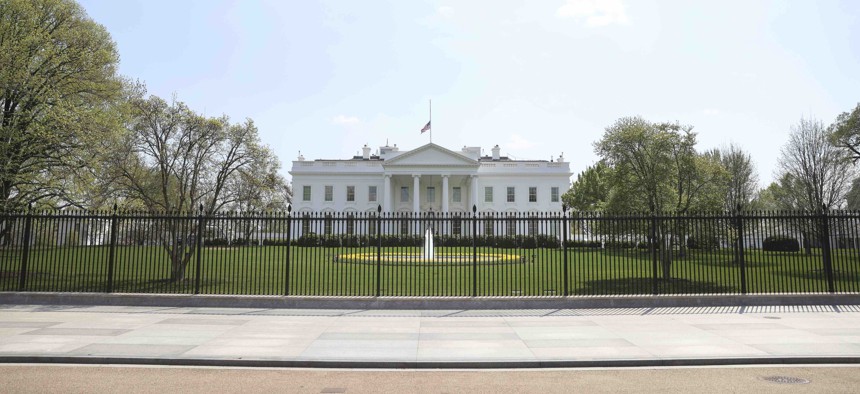Biden Meets With Bipartisan Group to Push for Infrastructure Plan

The White House from Pennsylvania Avenue outside the White House in Washington, on April 7, 2021. Tom Brenner/Pool via AP
The president gathered with eight congressional lawmakers, as his administration advocates for a roughly $2 trillion proposal focused on public works and other domestic priorities.
President Biden met Monday at the White House with a bipartisan group of lawmakers to discuss his roughly $2 trillion infrastructure and jobs package. The proposal is a pillar of the president's domestic agenda and could send billions of federal dollars gushing toward states and localities across the U.S. to help pay for public works and other costs. But Republicans have so far objected to the plan.
Biden, speaking to reporters at the top of the meeting, emphasized again, as he did last week, that he is willing to negotiate about the "extent" of the package and how to pay for it. Republicans have criticized the proposal as too costly and too sprawling, pointing to its focus on areas unrelated to more traditional steel and concrete public works, like roads and bridges. GOP lawmakers and some business leaders have also staked out opposition to Biden’s idea of funding the package by raising corporate taxes.
"It's going to get down to what we call infrastructure," Biden said, pointing to the replacement of lead water pipes as an example of an area where he believes new federal investments are required. "I think that's infrastructure," he said. "I think broadband is infrastructure. It's not just roads, bridges, highways."
But, over on Capitol Hill on Monday, Senate Minority Leader Mitch McConnell kept up his opposition to Biden's plan.
"Under the supposed veil of ‘infrastructure’, the White House has lumped together a motley assortment of the left’s priciest priorities," he said, speaking on the Senate floor.
McConnell criticized the plan for its tax increases, for proposed spending on "the far-left’s ‘green’ fads" and for elements focused on growing the nation's union workforce. "It’s not remotely targeted toward what Americans think they’re getting when politicians campaign on infrastructure," McConnell added.
Biden's plan calls for about $2.25 trillion in spending over the next decade.
Of that total, $621 billion would go to transportation—including $174 billion to boost the number of electric vehicles on the nation's roadways. About $590 billion would go to manufacturing, research and development and job training initiatives, according to an analysis by the Committee for a Responsible Federal Budget. Another large cost would be $400 billion to expand care for people who are aging or who have disabilities. There's also proposed spending on areas like housing, schools, the electric grid, water systems and broadband.
To pay for the plan, Biden has proposed raising the corporate tax rate to 28% from 21% and changing the tax code to collect more from companies’ overseas earnings.
Those attending Monday’s meeting included Sen. Maria Cantwell, Democrat of Washington, who chairs the Senate Committee on Commerce, Science, and Transportation, and Sen. Roger Wicker, of Mississippi, who is the panel’s top Republican.
Rep. Garret Graves, a Louisiana Republican, and Rep. Donald Payne Jr., a New Jersey Democrat, who both serve on the House Transportation and Infrastructure Committee, were also on hand.
Others who met with Biden included: Sen. Deb Fischer, a Nebraska Republican who serves on the Senate Commerce Committee; Sen. Alex Padilla, a California Democrat who sits on Environment and Public Works; Rep. David Price, a North Carolina Democrat who chairs the Appropriations subcommittee that oversees transportation and housing programs; and Rep. Don Young, an Alaska Republican, and former House Transportation and Infrastructure chair.
Congress returned this week to Capitol Hill after a two-week recess. The White House, meanwhile, has been ramping up its advocacy and outreach efforts to build support for the infrastructure package. On Monday it also released a set of state-by-state fact sheets meant to highlight the “urgent need in every state across the country” for the proposed investments.
White House spokeswoman Jen Psaki responded by pushing back when asked during a press briefing Monday about skepticism among some Republicans that Biden is being genuine when he says he's willing to negotiate across the aisle to come up with a deal.
"You don't use the President of the United States’ time multiple times over, including two infrastructure meetings—bipartisan infrastructure meetings he's already had—or the meeting today, if he did not want to authentically hear from the members attending about their ideas about how to move forward this package in a bipartisan manner," she said.
Editor's note: This story has been updated with additional comment.
Bill Lucia is a senior editor for Route Fifty and is based in Olympia, Washington.

NEXT STORY: Sustainable highway projects support connected vehicle infrastructure






